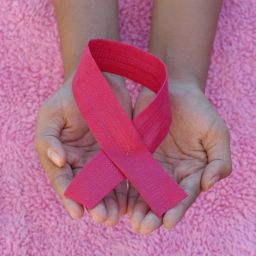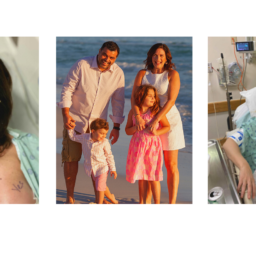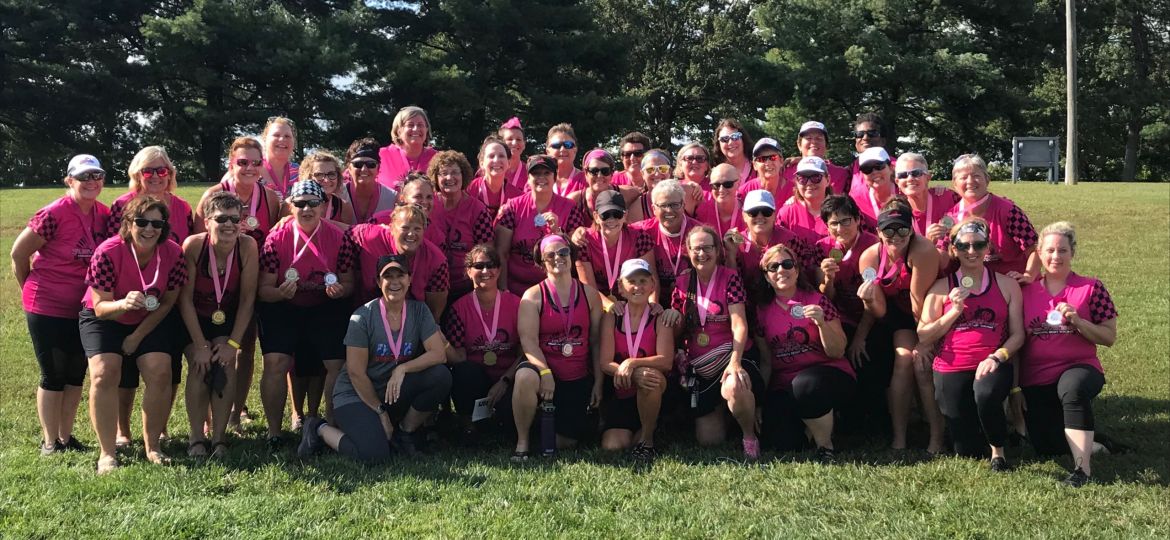
At 33 years old, Elizabeth Anderson was diagnosed with breast cancer.
Sarah Demmon was 38.
And Angie Kelish got her diagnosis at just 48 years of age.
Each woman was given news no one ever wants to hear, they’ll tell you. But all three women found healing and strength through the camaraderie of Indy SurviveOars, Indiana’s only dragon boat racing team.
Dragon boat racing is a sport where 18-20 people paddle a single dragon boat — long, narrow water crafts, resembling, well, dragons. At the front of the boat is a drummer, synchronizing the paddlers strokes, while a steerer is positioned at the back.
“With a breast cancer diagnosis, it can be scary,” says Anderson, president-elect of Indy SurviveOars. “After this diagnosis, by being a part of this team, you realize you can lead a full and active life full of success.”
Through their shared trials and bonds formed through sportsmanship, the team has come to think of each other as family.
“We fight like a family and we love like a family,” says Demmon, coach of Indy SurviveOars. “But we’re one team, one blade. One family.”
The same goes for Kelish. “There’s a sisterhood of support here,” says Kelish, assistant coach of Indy SurviveOars. “A lot of us think of each other as family.”
Dragon racing and breast cancer survivors
In 1996, Dr. Don McKenzie, a sports medicine doctor at the University of British Columbia, did a study on the belief that repetitive upper body exercise, such as paddling a dragon boat, could help prevent lymphedema in patients being treated for breast cancer. Historically, after mastectomies, patients were told to limit their upper body movement so as to not aggravate the arm and cause swelling. However, Dr. McKenzie thought the opposite.
And it turns out, he was right.
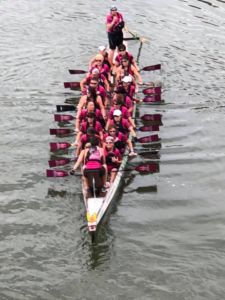 “Movement would help with the lymph system flow,” Demmon says. “If you look at the way a paddler moves the paddle and rotates the body, it helps with breaking up that scar tissue on the side, that lymphedema.” The women who participated in the the study also liked the camaraderie and sport that dragon boat racing provided them.
“Movement would help with the lymph system flow,” Demmon says. “If you look at the way a paddler moves the paddle and rotates the body, it helps with breaking up that scar tissue on the side, that lymphedema.” The women who participated in the the study also liked the camaraderie and sport that dragon boat racing provided them.
Since 1996, hundreds of breast cancer survivors across the world have formed dragon boat teams and are paddling regularly to promote good health and fun. Research now suggests physical activity not only has a positive effect on quality of life following a cancer diagnosis but may also improve survival.
“It’s exhilarating and it’s rejuvenating,” Demmon says. “It was just the breath of fresh air that I needed. No one ever wants to hear that they have cancer. God took a really ugly thing and made it into something really beautiful.”
Indy SurviveOars
Indy SurviveOars was founded by Lisa Heiden Peters, R.N., and Kathy Martin Harrison on May 31, 2007. Lisa, a breast cancer survivor, and Kathy, a passionate supporter, had a dream to bring dragon boat racing to breast cancer survivors in Indiana. Indy’s team is estimated to be the 50th breast cancer team to launch in the U.S.
“It’s grown globally, too,” Demmon says. “There are about 120 breast cancer teams now worldwide. Not only does the motion piece of dragon boating help with scar tissue, the more active you are, the higher your chances are for lessening recurrence. I’m a firm believer that sports is what enabled me to get through my treatment.”
The Indy SurviveOars practice approximately three times a week on Geist Reservoir when they’re in season: Monday and Wednesday night, and 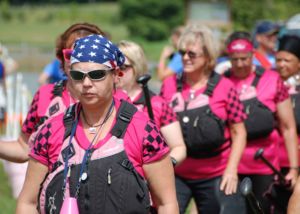 Saturday morning. Participant age ranges from women in their 30s to those in their 70s.
Saturday morning. Participant age ranges from women in their 30s to those in their 70s.
In a typical season, the team competes in about four races a year around the Midwest, such as Kentucky, Tennessee, and Illinois. Though they prefer to stay closer to home, to keep things new and exciting, the team tries to travel a little farther at least once a season to compete—as they did for a competition in Colorado Springs last year.
Every four years the team travels to an international competition for breast cancer survivors. Two years ago, they headed to Florence, Italy, which Demmon describes as the Olympics of dragon boat racing. In another two years, the team hopes to travel to New Zealand to compete.
Like most of the world, 2020 looked very different for the Indy SurviveOars 2020. For starters, the entire season was cancelled, for good reason, of course. But that didn’t make it any less disappointing.
Paddling in the age of COVID-19
As breast cancer survivors, having undergone chemotherapy and radiation treatments, the team is considered a high-risk group. So as to not miss the fellowship and physical activity that the sport provides, they’ve continued to stay connected through Zoom.
Indy SurviveOars gets together every Saturday for a virtual workout and does a team activity once a month via Zoom, like a trivia night.
“These activities allow us to continue our training,” Anderson says. “We don’t have any break in our training. So when we are on the water, we’ll be ready to go next season. It’s great because it’s allowing teammates to stay connected and be supportive with one another.”
In addition to in-person training being cancelled, the team had to cancel all October Breast Cancer Awareness events. Historically, the team has hosted various fundraisers, walks, and community events to bring awareness to their cause.
As the Indy SurviveOars continue to train for a 2020 season they won’t have, they’re looking ahead to the future and keeping their eyes on the prize — competing in New Zealand.
“We will be on the water next season for sure,” Anderson says.
Samantha Kupiainen is a regular Indy Maven contributor.




